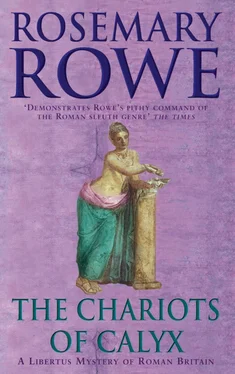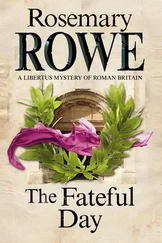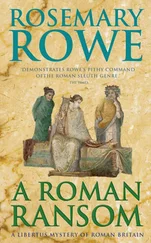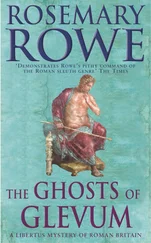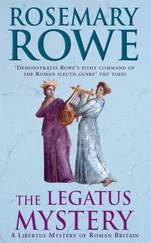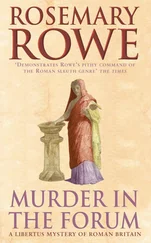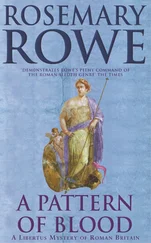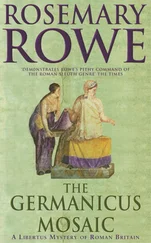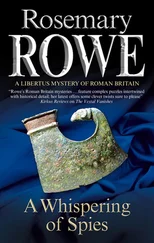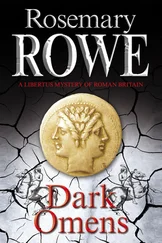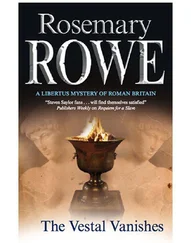Rosemary Rowe - The Chariots of Calyx
Здесь есть возможность читать онлайн «Rosemary Rowe - The Chariots of Calyx» весь текст электронной книги совершенно бесплатно (целиком полную версию без сокращений). В некоторых случаях можно слушать аудио, скачать через торрент в формате fb2 и присутствует краткое содержание. Год выпуска: 2002, ISBN: 2002, Издательство: Headline, Жанр: Исторический детектив, на английском языке. Описание произведения, (предисловие) а так же отзывы посетителей доступны на портале библиотеки ЛибКат.
- Название:The Chariots of Calyx
- Автор:
- Издательство:Headline
- Жанр:
- Год:2002
- ISBN:9781472205087
- Рейтинг книги:5 / 5. Голосов: 1
-
Избранное:Добавить в избранное
- Отзывы:
-
Ваша оценка:
- 100
- 1
- 2
- 3
- 4
- 5
The Chariots of Calyx: краткое содержание, описание и аннотация
Предлагаем к чтению аннотацию, описание, краткое содержание или предисловие (зависит от того, что написал сам автор книги «The Chariots of Calyx»). Если вы не нашли необходимую информацию о книге — напишите в комментариях, мы постараемся отыскать её.
The Chariots of Calyx — читать онлайн бесплатно полную книгу (весь текст) целиком
Ниже представлен текст книги, разбитый по страницам. Система сохранения места последней прочитанной страницы, позволяет с удобством читать онлайн бесплатно книгу «The Chariots of Calyx», без необходимости каждый раз заново искать на чём Вы остановились. Поставьте закладку, и сможете в любой момент перейти на страницу, на которой закончили чтение.
Интервал:
Закладка:
After what Junio had told me, I did not expect to learn anything more from questioning the household. ‘I have a more pressing matter to attend to,’ I explained. ‘My slave will be back in a moment with a litter. I hope to visit the charioteers in Verulamium, before the festival is over and the teams go on elsewhere.’
She nodded grimly. ‘So you are going to take my advice, at last. I am very glad to hear it. Perhaps now you will get on with it and search out that scoundrel who murdered my son.’
‘Indeed, madam, I hope to speak to Fortunatus soon,’ I said, and was rewarded with a grim smile as I moved towards the door. Instead of walking through it, however, I turned and looked at her. ‘Though there is one more thing I wish to ask you before I leave. I believe you have a necklace like the one that was used to strangle Monnius. A triple-stranded silver chain?’
She frowned. ‘I do. But surely that one was Fulvia’s? What else would Fortunatus use?’
‘It was not Fulvia’s, madam citizen. She has it with her. And Lydia is wearing hers — I noted it a moment ago. Can you produce yours?’
Annia Augusta flushed. ‘I can. At least, I can account for where it is. I lost one of the small stones set into the chain, and Monnius sent it to the jewel merchant to have the gem replaced. I suppose it is still in the workshop. It would be easy to check.’ She looked at me suddenly. ‘You are surely not suggesting, citizen, that I strangled my son? I would have more wit than to do it with my own necklace if I did.’
And that, I thought, as I followed her meekly back through the house, was certainly true. Unless she had done it with her own necklace hoping that everyone would reason in that way.
As with many town houses, there was no way to the entrance except via the atrium, and I was obliged to sidle my way round the edge though the funeral bier was now laid out in the open space at the back of it, and the extravagant rituals of official grief were being observed. Fulvia was still there, tunefully lamenting, while the pipers wailed and the professional keeners beat their breasts and wept. Pine cones had been added to the braziers, to disguise the smell of human corruption, and the air was heavy with the scent of candles, incense and herbs.
I went into the entrance passage and the doorkeeper nodded at me from his niche as I passed. ‘Water and fire in those pots, citizen. On the lady Lydia’s orders. She said to tell you they were there, so you could purify yourself properly.’ I must have looked startled — this formality was not usually observed by mere visitors to a house. He winked. ‘Always a stickler for fulfilling observances, the lady Lydia.’
I obliged, and was stepping obediently over the ‘fire’ (a small metal bowl with a few coals burning in it) when a thought occurred to me.
‘Last night,’ I said, rinsing my hands solemnly in the perfumed water, and drying them on the small towel provided, thereby ‘washing my hands of death’ in the approved Roman fashion, ‘did you see all the feasters leave the house?’
He was suddenly sober. ‘Oh yes, citizen. And their slaves. The master was always terrified of plots against him, and I was always most careful to see that everyone had gone.’ He looked anxious now. ‘The other servants will bear me out. You will tell the governor that, won’t you? Annia Augusta will have me whipped as it is, for falling asleep at my post, and if they think I allowed one of the feasters to hide in the house. . dear Jupiter! I shall be lucky to come out of it alive. And then I let that Eppaticus in this morning — oh, merciful gods!’ He began to pluck at my toga in agitation.
I handed him the towel to occupy his hands, and hastened past him out of the door. What a household of tensions, I thought. It was quite a relief to get out into the open air again. Junio was there, with the same litter which had carried me to the house earlier — it was at my disposal for the day, I learned, and had been standing by for further instructions, on the orders of the governor. Junio helped me in, and we set off again at a brisk pace.
In no time at all we were back at the palace. We swept in through the gates, and the crowds of people who had business with the governor and were jostling in the courtyards stood back to let us pass. There were dozens of them, of every age and class, dressed in everything from tunics to togas. I realised for the first time what an immense administrative burden Pertinax must bear, in addition to his military duties — no wonder he had a household of scribes and secretaries at his disposal, as well as guards and sentries, though of course even the clerks were officers seconded from the army.
The governor was in council when we arrived, so a long-nosed secretary told us as we were ushered into the palace. Nevertheless, the man condescended to carry a message when he discovered who I was. He provided a wax tablet, on which I scratched a few words, and bore it off importantly, leaving me standing in the colonnaded entrance. I felt rather foolish and conspicuous, especially as other appellants (some of them important people, judging by the wide patrician stripes on their togas) were being turned away or briskly told to come back tomorrow when the governor would receive them. People were gazing at me curiously, and whispering behind their hands.
After what seemed an eternity the long-nosed clerk returned, his manner now entirely respectful. ‘The governor’s apologies,’ he murmured abjectly, ‘but he was unable to leave the meeting. However, your requests are being dealt with, and a carriage-driver is being found to take you to Verulamium without delay. His Excellence has given you this’ — he handed me a letter-scroll of bark, sealed with the governor’s personal seal — ‘which will ensure you lodging at any military post. He is sending you a small purse to defray expenses, and if you like to go to the triclinium he has ordered a light repast for you before you undertake the journey. There is a meal awaiting your slave, too, in the servants’ quarters.’
I blessed Pertinax for his swift and generous response, and went to partake of the ‘light repast’ as suggested, a good, simple meal of cold meat and fruits. I was in the process of washing it down with a large jug of cool, clean water when the serving boy sidled up to me and murmured apologetically in my ear.
‘I am sorry to disturb you, citizen, but there is someone wishing to see you. Urgently, he says, before you leave.’
I glanced towards the doorway indicated. Superbus stood there, although there was no longer anything superb about him. He looked shocked and ruffled, his immaculate tunic crumpled and torn at the neck, and as he came towards me in answer to my signal I saw that he was hobbling a little. One of his smart sandals was broken, although he still approached with as much formality as he could muster. It gave him a kind of touching dignity.
‘Superbus,’ I said in greeting. ‘What has happened to you?’
He bowed gravely. ‘I was attempting to fulfil your orders, citizen, when I had an altercation in the market.’
‘I am sorry to hear that,’ I said. ‘What happened?’
Superbus heaved a reproachful sigh. ‘I had been asking questions, citizen, as you directed, trying to find out about Eppaticus — though contrary to your expectations, no one seemed to know anything, at least not anything that they were willing to tell me. The moment I so much as mentioned his name, everyone suddenly became secretive. No one would admit to having dealings with him. He trades in this and that, was all I could discover. Wine two months ago, slaves last month, anything — it differs from month to month.’
That in itself was interesting. I had already suspected that some of Eppaticus’ activities were on the outskirts of the law. If his customers were less than helpful, it was almost certainly because they were afraid of the aediles , the market police — or of what Eppaticus himself would do to them if they betrayed him to the authorities.
Читать дальшеИнтервал:
Закладка:
Похожие книги на «The Chariots of Calyx»
Представляем Вашему вниманию похожие книги на «The Chariots of Calyx» списком для выбора. Мы отобрали схожую по названию и смыслу литературу в надежде предоставить читателям больше вариантов отыскать новые, интересные, ещё непрочитанные произведения.
Обсуждение, отзывы о книге «The Chariots of Calyx» и просто собственные мнения читателей. Оставьте ваши комментарии, напишите, что Вы думаете о произведении, его смысле или главных героях. Укажите что конкретно понравилось, а что нет, и почему Вы так считаете.
